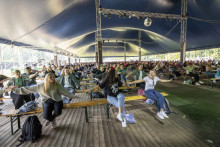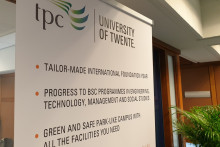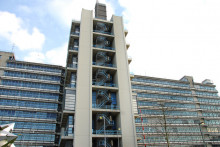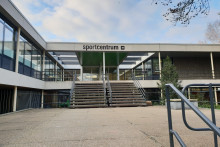The influx of UT bachelor's students increased, from 2007 to 2087 freshmen: an increase of four percent, mainly due to an increase (53 percent) in non-EEA students. These are students from outside the European Economic Area (EEA). There was an increase of eight percent in the intake of masters: from 1159 to 1248. This increase was also due to international students, mainly who moved on from a bachelor's degree.
Disappearance of numerus clausus
Regarding the Bachelor's intake, a few programmes stand out. Technical Computer Science is by far the biggest riser and welcomed more than a hundred extra students (+51 percent). This increase even means that the UT does not record a minus in student influx but a plus. The increase is caused by the disappearance of the numerus clausus in the study programme. The downside of this is that Business Information Technology (BIT) saw 23 percent fewer students enrolling.
In the Bachelor's programme, Mechanical Engineering is also doing well, both at UT-VU and the UT's own programme. In total, 69 more Mechanical Engineering students enrolled than last year. Civil Engineering also recorded an increase from 61 to 88 first-year students, which is attributed to a successful campaign to increase the visibility of the programme.
Delft University of Technology
There are also programmes that attracted fewer bachelor's students than before. This was especially the case with Industrial Design Engineering: 35 percent in the negative. Programme director Wim de Boer blames it on a combination of factors, such as the pressure on internationalisation, the shrinking region and a shrink in profile choice. 'And I think what plays a role is that Delft has removed the numerus clausus on industrial design. Remarkably, the programme was not even full, but a numerus clausus can have a deterrent effect, which may now have disappeared.'
There are also concerns for some medical programmes; Health Sciences, Biomedical Engineering, and Technical Medicine (TM) welcomed fewer undergraduate students. For example, TM went from 143 to 105 bachelor's students and from 73 to 45 master's students.
Technical Medicine
TM programme director Katja Haijkens hopes that this year's lower bachelor's intake will be a one-off. 'The figures that are available so far for next year also seem to indicate this. There is also a great demand from secondary schools for information about our health programmes. At the same time, we know that there are fewer young people demographically in the Netherlands and that the trend seems to be that students in the Netherlands are less likely to choose a technical profile. By opting for an unweighted lottery, we want to make our programme more accessible and hope that this switch will also make a positive contribution to the intake.'
According to Haijkens, the decrease in master's intake is due to Technical Medicine bachelor's students who opted for another (UT) master's programme. Moreover, according to her, it is relatively difficult for the programme to attract lateral entrants, because of the legal requirements that Technical Medicine students have to meet. 'In addition, the profession is still relatively young, and some students may be a bit uncertain about their career prospects. Fortunately, we have seen that the field of work has developed enormously recently: more and more hospitals have their own departments for TM staff and we are seeing an increasing demand for TM staff in healthcare.'
Cost analysis
When it comes to master's intake, Computer Science (+32 percent), Business Administration (+21 percent) and Robotics (+40 percent) stand out in a positive way, compared to declines in Applied Physics (-33 percent) and Health Sciences (-14 percent).
Whether there is an increase or a decrease: about a third of the bachelor's programmes record an intake of under or around sixty first-year students. That number is seen as a break-even point, according to the cost analysis that was shared by the Executive Board with the University Council last week.
In general, a programme with fewer than sixty students enrolling is loss-making, according to this analysis. And the UT wants and needs to do something about that given its financial situation, even though the analysis was only a first step and the University Council was critical of the document. Part of the plans is that each programme will have its own mandatory budget – and must stick to it.
'An untargeted clear-cut'
Nationally, universities attracted 6 percent fewer international bachelor's students this academic year. And then the strict cabinet plans still have to come into force. UNL, the umbrella organisation for universities, fears 'an untargeted clear-cut'.
Six months ago, universities announced their intention to reduce the international intake. Admittedly, at the request of politicians in The Hague, but the institutions also felt that growth could not continue indefinitely. They decided to teach more in Dutch and recruit fewer students abroad.
But then, a new cabinet appeared. This new government wants to cut 293 million euros from international students as soon as possible and will make the monitoring of English-language education much stricter.








